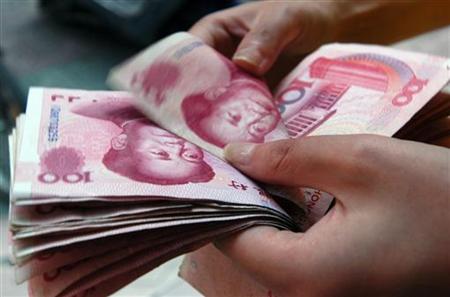Currency issue is not a WTO jurisdiction
 0 Comment(s)
0 Comment(s) Print
Print E-mail
China.org.cn, November 18, 2011
E-mail
China.org.cn, November 18, 2011
|
 |
|
A man counts?RMB notes. [File?photo] |
The World Trade Organization (WTO) is not the authority to make decision on currency issue, a senior commerce official said on Thursday.
"Different global organizations have different tasks and responsibilities," Yu Jianhua, assistant minister of commerce, told China Daily after a news briefing marking China's entry into the WTO 10 years ago.
"The International Monetary Fund is in charge of currency issues, and the WTO takes care of foreign trade affairs," he said. "So far, we have not noticed any sort of investigation into currency related issues or disputes launched by the WTO."
"Work division in international organizations must be on the basis of cooperation but clarified," he added
Currency policy takes account of, among other things, trade protectionism and material costs, Yu added.
His remarks were in response to reports that the 153 members of the Geneva-based trade body have agreed to discuss whether nations protect domestic industries by currency manipulation. They have agreed to hold a meeting on the issue, probably in the first half of 2012, Keith Rockwell, spokesman for the WTO, was quoted as saying in a Wall Street Journal online report.
But commenting on the report, Yu said that "global organizations should firstly make sure that they are doing their own jobs.
"China will clearly elaborate our position on currency issues," he said.
The US Senate approved a bill last month that would allow the US to charge extra duties on Chinese imports, claiming that American businesses were harmed by China's alleged manipulation of the yuan. But US House Speaker John Boehner opposed the bill, saying it posed a "very severe risk of a trade war" between the world's top two economies.
In September, Brazil called on the WTO to allow members to protect domestic industries from trade imbalances prompted by currency fluctuations. The country's foreign ministry said that mechanisms, including anti-dumping and safeguards, as well as retaliation rights, need to be updated to deal with "steep fluctuations in exchange rates".
The WTO will discuss this at a meeting of trade ministers next month, Rockwell was quoted as saying.
The WTO treaty does not allow countries to leverage currency to "frustrate" other countries that were expecting market access when signing on to the WTO rules, he said.
But experts agreed with Yu, from the commerce ministry, expressing doubts on whether it is right for the WTO to get involved in the specific issue.
"We cannot deny that foreign exchange has had an impact on foreign trade, but from what I know, it's the IMF, not the WTO, that should deal with it," said Li Zhongzhou, a former official from the Ministry of Commerce and the lead WTO expert from the EU-China Trade Project.
"I expect it (the meeting) will probably be about discussions rather than striking agreements," Li said.
"Although Brazil's proposal did not specify which countries it believed were undervaluing their currencies, China will probably be a target of the discussions among WTO members, which will translate into pressure," Li said.
China's currency issue came under the spotlight at the recent summit of leaders of Asia-Pacific economies. At the end of the summit, US President Barack Obama said "enough's enough", referring to what he considered inadequate appreciation of the yuan. But President Hu Jintao fought back by saying that China is following a responsible exchange-rate policy and isn't to blame for US economic woes.
Shen Danyang, spokesman for the commerce ministry, said on Wednesday that the yuan was not a source of trade imbalance between China and the US.
Since it was revalued in July 2005, the yuan has gained by 30 percent against the dollar and appreciated by about 10 percent since the government ended a two-year peg in June 2010.
During the first 10 months of the year, China's trade surplus fell to less than 1.4 percent of its gross domestic product, from under 3 percent in 2010.
But China's trade surplus with the US has been widening. "We cannot attribute the trade imbalance to China's currency. There are two possible reasons: the US has its own problems in its economic structure and restrictive measures on its exports to China," Shen said.
China's trade surplus with the US comes mainly from the "processing trade" (components imported, products exported) and foreign businesses transferring their production from other Asian economies, including Japan and South Korea, to China, said Yu.
This year marks the 10th anniversary of China's entry into the global trade body.
"China has kept its promise of opening the door to the world during the past decade, and we will continue to do that and actively get involved in globalization," Yu said.
The financial, logistics and medical services sectors will be broadened, he said.





